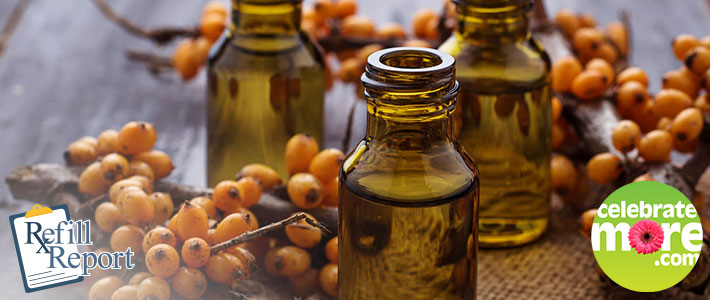Essential Oils: Useful or Harmful?
We have another guest blogger, introducing Tifany Steentra….Tifany is a Student Pharmacist from NDSU spending a couple weeks with us at our main office. Tifany wanted to share some information around the use of Essential Oils.
The use of essential oils are becoming more popular as a natural alternative to medicine, but the effectiveness and safety are unclear.
Essential oils have been around for thousands of years. They were used in religious ceremonies, added to cosmetics, used in traditional medicine, and added to various items for the aroma of the oils. 1
They were first recorded in ancient Egypt, India, and Persia. At the time, these oils were prepared by placing the flower, leaves, or roots in fatty oils. It wasn’t until the Golden Age (500 to 300 BC) that Arab culture developed the first distillation process for essential oils. 1
People have been claiming essential oils are natural alternatives for many different ailments, but what really is an essential oil? Essential oils are plant extracts made by steaming or pressing the plant’s flowers, bark, leaves, or fruit. When inhaled, the molecules of the oils travel from the olfactory nerves, the nerve fibers relating to the sense of smell, straight to the brain. The brain then sends a signal to the amygdala, the center of the brain responsible for emotions.2
Due to the lack of regulation, the quality of these oils vary on the market between different companies. Some essential oils are purer than others, which can be diluted with less expensive ingredients, therefore ingestion is not recommended. 2
Lavender is one of the most used essential oils and is claimed to be an effective sleep aid. A clinical trial was conducted on seventy-nine college students with self-reported sleep issues. This trial studied the effect of inhaled lavender on sleep hygiene. The patients using lavender demonstrated a significant improvement in sleep quality compared to the controlled group at post-intervention and at the two week follow up. However, it did not show a significant difference in sleep quantity.3
Peppermint is another commonly used essential oil. This oil is generally used to improve nausea and vomiting. A clinical trial was conducted to test the effect of peppermint oil aromatherapy on the severity of nausea and vomiting in pregnancy. The severity of nausea and vomiting in the pregnant population and the controlled group significantly decreased, but there was not a statistically significant difference between the two groups. 4
These essential oils may show improvement in some instances, however that does not exclude them from having side effects or drug-drug interactions.
Lavender oil can cause an unusual side effect called reversible prepubertal gynecomastia in 7-10-year-old male patients. Prepubertal gynecomastia refers to the growth of breasts in this younger population of males. After discontinuing lavender use in these patients, the abnormal defects disappeared. 5
Lavender oil may also cause drug-drug interactions. These interactions are said to be caused by the activation of a couple receptors (GABAa and H3 receptors) that certain medications commonly bind to. If these medications cannot bind to the receptors, they will stay in your system, which could decrease their efficacy and increase your risk for side effects.6
The most common side effect of peppermint oil is the exacerbation of heartburn symptoms. Peppermint may also increase the risk of bronchospasms, tongue spasms, or even respiratory arrest in children, and therefore should be avoided. There is also a significant amount of drug interactions with the use of peppermint oil due to its inhibition effects on an enzyme called CYP1A2. This enzyme is used to break down certain medications. If these medications cannot be broken down appropriately, it can increase your chances of experiencing dangerous side effects.7
Overall, it can be concluded essential oils have been shown to be effective for some uses and are relatively safe for adults. However, they have been shown to cause adverse reactions and drug interactions, therefore they should be used with caution. The use of any natural supplement should be discussed with your pharmacist or doctor to ensure it is safe to be taken with your other medications. Studies are currently being done to investigate further uses and safety. The next question is, will essential oils be a part of the future of healthcare?
REFERENCES
1. Essential oil Plant Substance. Britannica [Internet]. [Cited 2019 Nov 3] Available from: https://www.britannica.com/topic/essential\oil 2. Gujral H. Aromatherapy: Do Essential Oils Really Work? John Hopkins Medicine [Internet]. [Cited 2019 Nov 3] Available from: https://www.hopkinsmedicine.org/health/wellness\and\prevention/aromatherapy\do\essential\oils\really\work 3. Lillehei AS, Halcón LL, Savik K, Reis R. Effect of Inhaled Lavender and Sleep Hygiene on Self\Reported Sleep Issues: A Randomized Controlled Trial. J Altern Complement Med. 2015 Jul; 21 (7):430-8. Doi: 10.1089/acm.2014.0327. Epub 2015 Jun 2. PMID: 26133206; PMCID: PMC4505755.
4. Joulaeerad N, Ozgoli G, Hajimehdipoor H, Ghasemi E, Salehimoghaddam F. Effect of Aromatherapy With Peppermint Oil on the Severity of Nausea and Vomiting in Pregnancy: A Single\blind, Randomized, Placebo\controlled trial. J Reprod Infertil. 2018; 19(1):32-38 PMCID: PMC5960050
5. Henley DV, Lipson N, Korach KS, Bloch CA. Prepubertal Gynecomastia Linked to Lavender and Tea Tree Oils. N Engl J Med. 2007 Feb; 356:479-485. Doi: 10.1056/NEJMoa064725
6. Koulivand PH, Ghadiri MK, Gorji A. Lavender and the Nervous System. Evid Based Complement Alternat Med. 2013; 2013: 681304. doi:10.1155/2013/681304. Epub 2013 March 14. PMID: 23573142; PMCID: PMC3612440
7. Kligler B, Chaudhary S. Peppermint Oil. Am Fam Physician. 2007 April 1; 75970:1027-1030 PMID: 17427617









